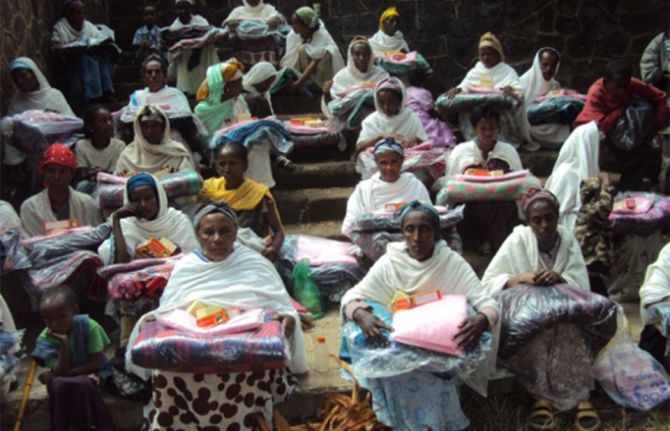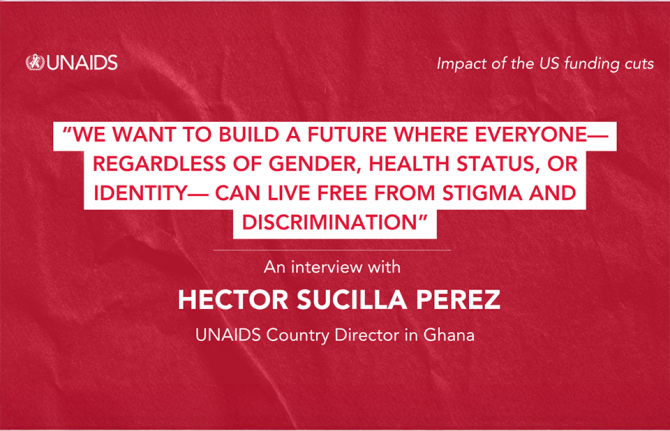
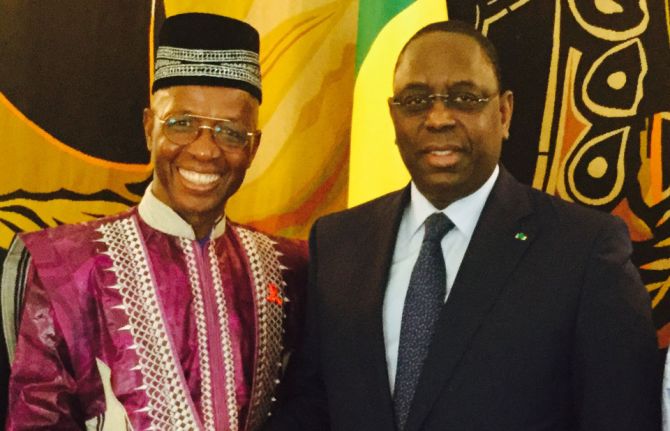
Update
President of Senegal to lead efforts to increase access to HIV treatment in western and central Africa
30 January 2017
30 January 2017 30 January 2017The President of Senegal and Chairperson of the New Partnership for Africa's Development (NEPAD), Macky Sall, reaffirmed his commitment to support efforts to ensure that 90% of the 4.5 million people living with HIV in western and central Africa have access to HIV treatment by 2020. The commitment was made during a meeting with Djibril Diallo, Director of the UNAIDS Regional Support Team for West and Central Africa.
With a treatment coverage of only 28%, the region is not on track to achieve the 90–90–90 targets whereby, by 2020, 90% of people living with HIV know their HIV status, 90% of people who know their HIV-positive status are accessing treatment and 90% of people on treatment have suppressed viral loads. However, during the High-Level Meeting on Ending AIDS, which took place in New York, United States of America, in June 2016, heads of state agreed to develop a plan for countries in the region to achieve the 90–90–90 targets on time. President Sall was designated as the champion of the initiative.
In this capacity, President Sall will seek support from his African peers for greater involvement and urgent action in the region. He also committed to discuss with the Presidents of Canada and France a call to raise additional funding for the AIDS response in the region.
Finally, he gave an assurance that he will elevate the profile of the local AIDS response in Senegal in order to make it a model for the other countries in the region. For that, he will mobilize additional annual funding to achieve universal coverage of prevention of mother-to-child transmission by 2018 and the 90–90–90 targets by 2020.
Quotes
“It is essential that we achieve the elimination of mother-to-child transmission of HIV and I am committed to ensure that no child is born with HIV in Senegal as from 2018. It is also important to continue mobilizing the other presidents of western and central Africa for their full engagement in the regional response to AIDS.”
“The highest political support is critical to translate the western and central Africa initiative into concrete gains for people living with HIV, and we thank the President of Senegal for his commitment to continue to be a champion for the AIDS response in the region.”
Region/country

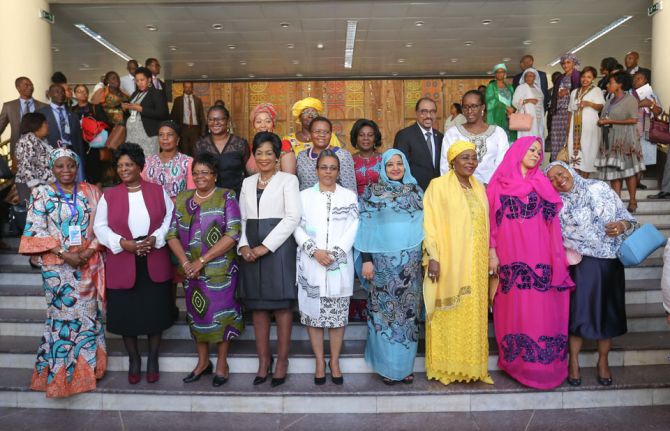
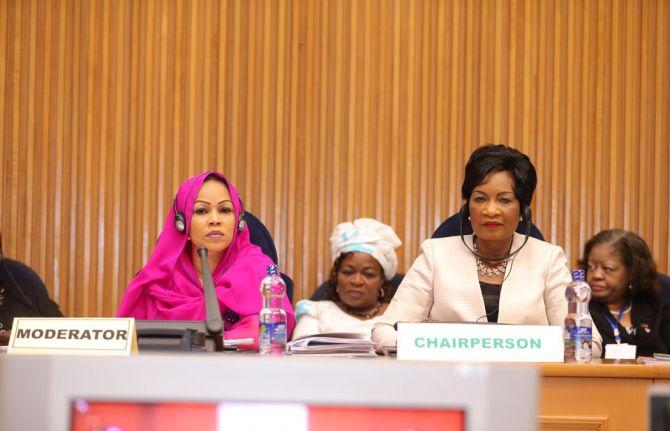
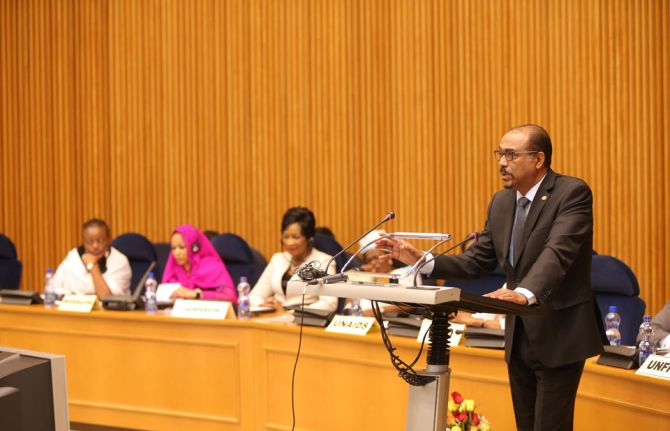
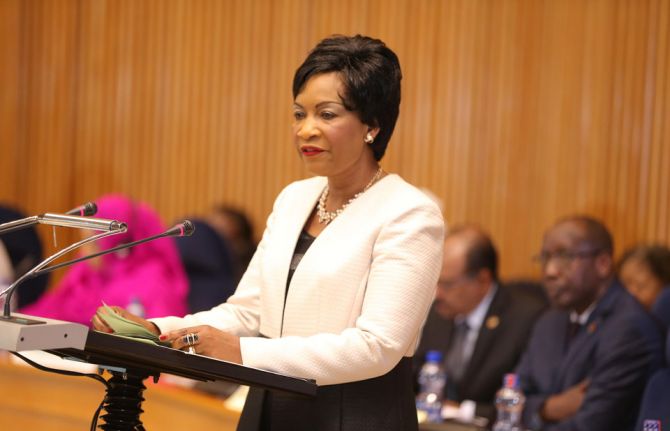
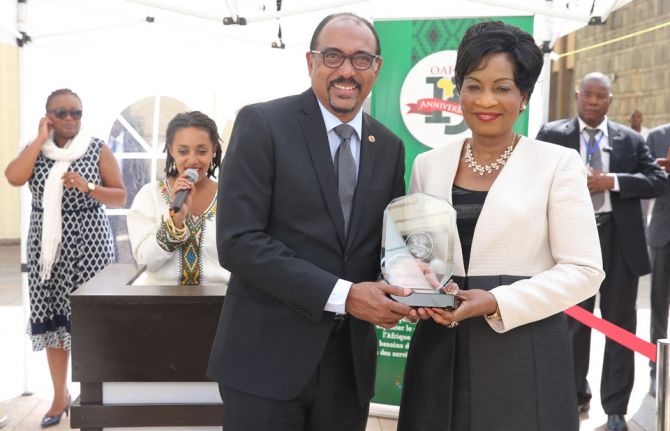
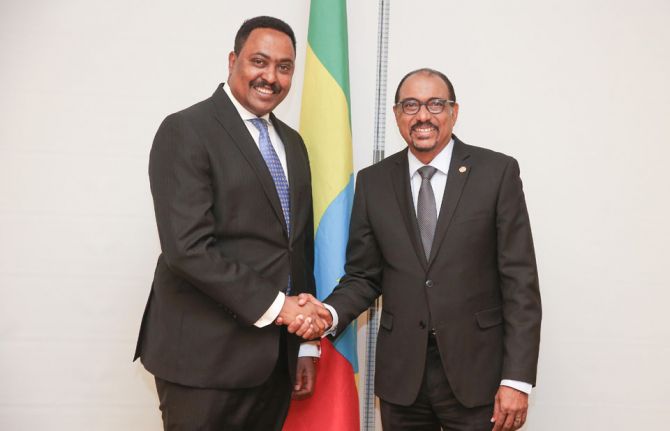
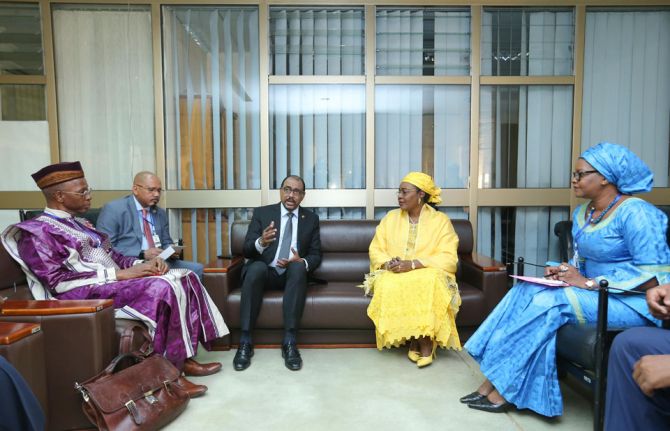
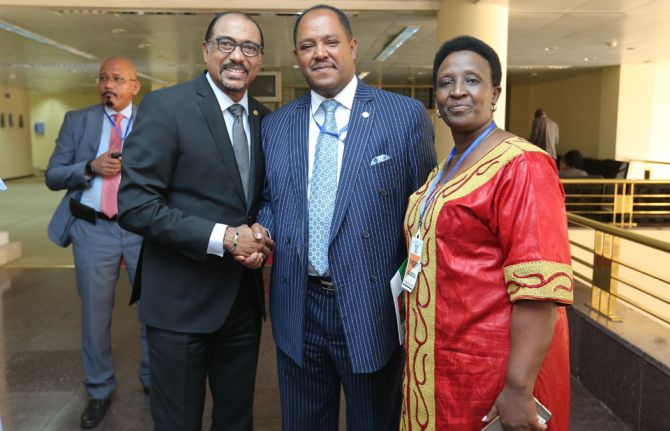
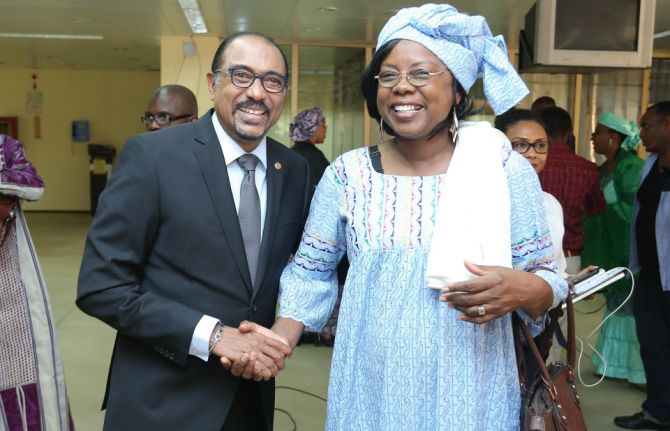
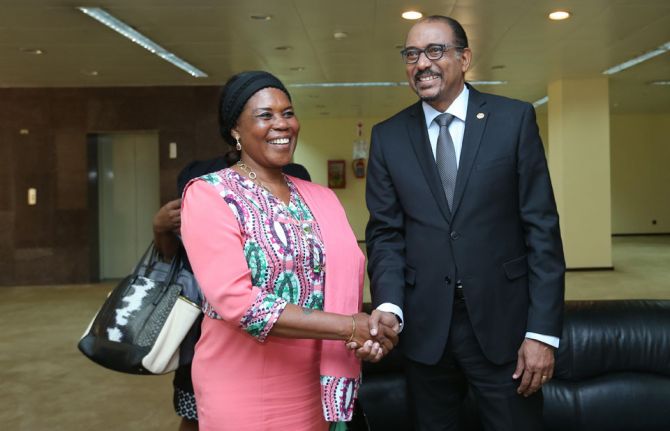
Update
African Union Summit emphasizes focus on young people in Africa
01 February 2017
01 February 2017 01 February 2017The 28th African Union Summit closed on 1 February with the election of Chad’s Moussa Faki Mahamat as the new chairperson of the African Union Commission. The theme of the summit was “Harnessing the demographic dividend through investing in youth” and strong calls for African solidarity resonated through the summit. In his speech, the United Nations Secretary-General, António Guterres, stated that the United Nations stands as a proud partner of the African Union and will continue to tap into African wisdom, ideas and solutions.
In side meetings with the President of Uganda, Yoweri Museveni, and the Prime Minister of Ethiopia, Hailemariam Desalegn, the UNAIDS Executive Director, Michel Sidibé, emphasized the need to revitalize the AIDS response on the African continent. Noting that while many gains have been made, for example in the area of eliminating mother-to-child transmission of HIV, Mr Sidibé urged both leaders to step up HIV prevention efforts among adolescent girls and young women in their respective countries.
The 18th General Assembly of the Organisation of African First Ladies against HIV/AIDS (OAFLA) also took place on the sidelines of the summit. The meeting coincided with the 15th anniversary of OAFLA. Mr Sidibé presented the President of OAFLA, Gertrude Muthakira, First Lady of Malawi, with a publication covering the significant milestones of OAFLA over the past 15 years. Mr Sidibé also received an award from OAFLA for his contribution to the organization and the global AIDS response.
In his bilateral meetings with the First Ladies of Niger, Equatorial Guinea and Malawi, Mr Sidibé reiterated again the need to focus on adolescent girls and young women, who are currently being left behind by the AIDS response in Africa.
Quotes
“In partnership with the Organisation of African First Ladies against HIV/AIDS, UNAIDS will continue to push for an accelerated HIV response for adolescent girls and young women from all over Africa.”
“We have come a long way in reducing the impact of HIV. There is no room for complacency. I stand ready to work with liked-minded leaders to revitalize the response on the African continent.”
“The AIDS response needs to divert more attention to young men and women, girls and boys, who comprise a majority of our populations in our respective countries.”

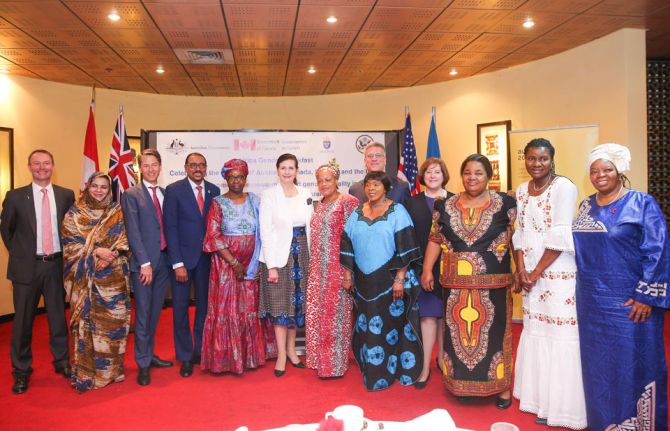
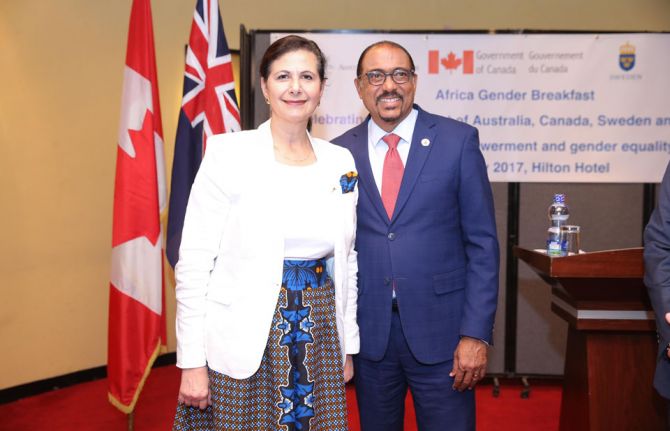
Update
African Gender Breakfast highlights action needed on adolescent girls and young women in Africa
30 January 2017
30 January 2017 30 January 2017In 2015 in Africa, 310 000 new HIV infections occurred among adolescent girls and young women between the ages of 15 and 24 years—approximately 6000 new HIV infections per week. In eastern and southern Africa, of the 19 million people living with HIV, women account for more than half (59%), and in western and central Africa 58% of the 6.5 million people living with HIV are women.
These statistics, and an appropriate response to them, were discussed at the Africa Gender Breakfast meeting, held in the run-up to the 28th African Union Heads of State Summit. The meeting was hosted by the Ambassadors to Ethiopia of Australia, Canada and Sweden, as well as the United States of America mission to the African Union, and was attended by the UNAIDS Executive Director, Michel Sidibé, African gender ministers and representatives of civil society and the private sector. The purpose of the meeting was to galvanize the international development community into more urgent action for adolescent girls and young women.
At the meeting, the Australian Minister of International Development and the Pacific, Concetta Fierravanti-Wells, launched a US$ 1 million partnership with the African Union Gender Directorate. Half of these funds will go towards establishing a gender observatory that will produce annual strategic information on the status of women in Africa.
The Canadian Ambassador to Ethiopia, Philip Baker, affirmed that Canada’s international programming will have a renewed focus on gender equality, informed by its recent election onto the Commission on the Status of Women.
Quotes
“After more than 35 years of charters, declarations and instruments, a serious gap between rhetoric and implementation in gender programming still remains.”
“I applaud UNAIDS Executive Director Michel Sidibé for his leadership in galvanizing global attention and discussion on HIV and adolescent girls and young women.”
“We must all continue struggling to remove all obstacles to gender equality and empowerment of women. This is an economic, political and moral mandate.”
Region/country
Related

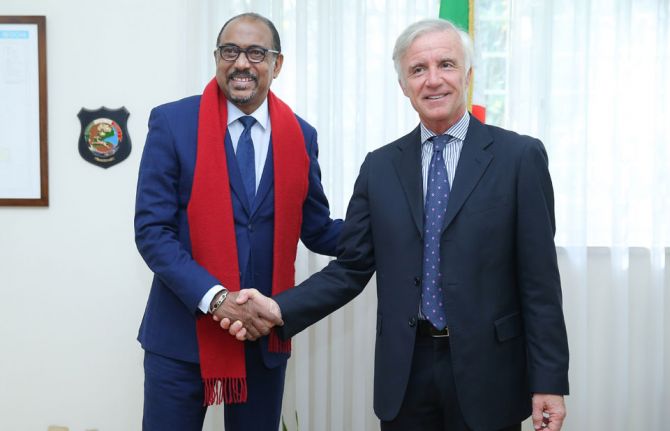
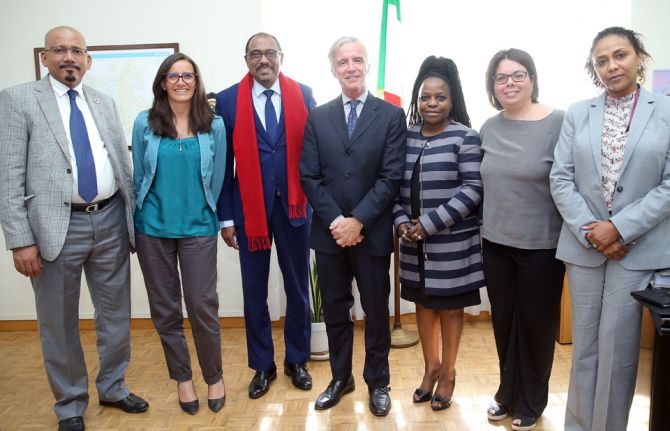
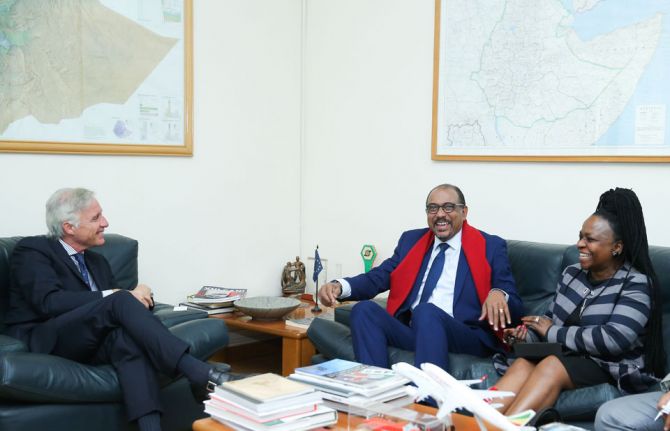
Update
UNAIDS and Italian Development Cooperation strengthen partnership to end AIDS
27 January 2017
27 January 2017 27 January 2017UNAIDS Executive Director Michel Sidibé acknowledged the cooperation between UNAIDS and Italian Development Cooperation in the response to AIDS in Ethiopia during a meeting with the Italian Ambassador, Giuseppe Mistretta, in Addis Ababa, Ethiopia, on 27 January.
Mr Sidibé also expressed his gratitude to the Government of Italy for the recent approval of €500 000 in support of the decentralized HIV response in the Southern Nations, Nationalities and Peoples’ Region (SNNPR) of Ethiopia. The goal of this project is to reduce communicable diseases, including HIV and other sexually transmited infections in SNNPR through programmes focusing on disease prevention, health promotion and strengthening of peer support groups. Special attention will be placed on reaching out to women and young people to ensure their well-being.
UNAIDS and Italian Development Cooperation have been working together to strengthen the engagement of civil society organizations in the AIDS response in the country and to ensure that resources for HIV are used effectively and that accountability mechanisms are in place to ensure results.
Quotes
“I am very impressed by the partnership between UNAIDS, Italian Development Cooperation and the Embassy of Italy in Ethiopia in the response to HIV and in advancing health.”
“Italy is very pleased to collaborate with UNAIDS and we look forward to this collaboration showcasing concrete impact in addressing HIV in Ethiopia."
Region/country
Related

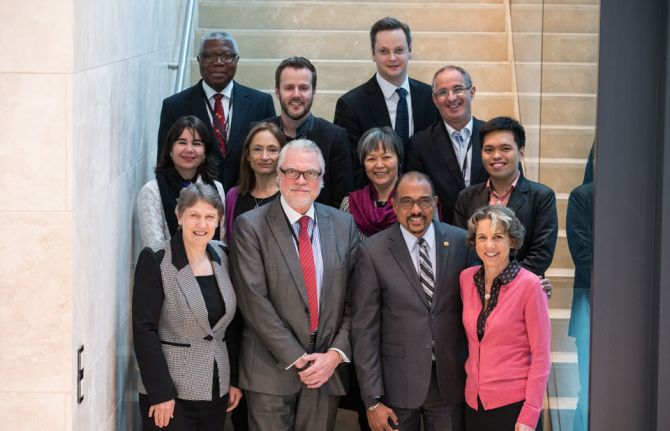
Update
Review panel meets to strengthen UNAIDS model
24 January 2017
24 January 2017 24 January 2017A special panel has begun deliberations on how to strengthen UNAIDS’ unique model and further align it to international efforts to achieve the 2030 Agenda for Sustainable Development.
The Global Review Panel on the Future of the UNAIDS Joint Programme Model includes representatives of United Nations Member States, key populations affected by HIV, United Nations agencies and other multilateral organizations and private foundations. Established by the UNAIDS Programme Coordinating Board, the panel is co-convened by Helen Clark, Chair of the United Nations Development Group, and UNAIDS Executive Director Michel Sidibé and co-chaired by Awa Coll-Seck, Health Minister of Senegal, and Lennarth Hjelmåker, Sweden’s Ambassador for Global Health.
At the first meeting of the panel, held on 20 January in Geneva, Switzerland, Ms Clark called on the panel to ensure that UNAIDS remains at the forefront of United Nations reform, while Mr Sidibé challenged panel members to develop bold ideas for the future of the Joint Programme.
Mr Hjelmåker praised UNAIDS for its leadership, advocacy and catalytic role within the global response to HIV. He also highlighted that key aspects of the Joint Programme need to be refined and reinforced to ensure that joint United Nations efforts on AIDS are fully integrated within the broader health agenda and the Sustainable Development Goals.
During the meeting, panel members achieved consensus on key issues to be addressed within three fundamental pillars of the Joint Programme: joint working, governance, and financing and accountability. Moving forward, these issues will be further discussed in February within a public virtual consultation. The panel will meet again in March to consider the results of the public consultation and agree on a set of recommendations.
Quotes
“The interlinked nature of the 2030 Agenda calls for integrated approaches to sustainable development. The global AIDS response has always required us to work in this way, especially when it comes to addressing the social and structural factors which contribute to the spread of HIV."
“The Joint Programme is unique. We have been able to demonstrate that we can mobilize diverse partnerships, engage in different forms of governance, deliver results and ensure people are not left behind. We need to retain these fundamental elements while introducing innovations that will accelerate the AIDS response.”
"Having accompanied UNAIDS on its journey for two decades, I can say confidently that it has many strengths that are extremely relevant to current efforts around United Nations reform. But even UNAIDS must adapt to the current environment. We are tasked with identifying key challenges and making recommendations that will generate real change and that are feasible to implement.”
“UNAIDS continues to be heralded as an innovative good practice 20 years later. Its efforts to include civil society, key population communities and those most affected by HIV showcase how the Joint Programme values a responsive approach towards addressing the epidemic, and accountability to those most affected. This must continue.”
Related

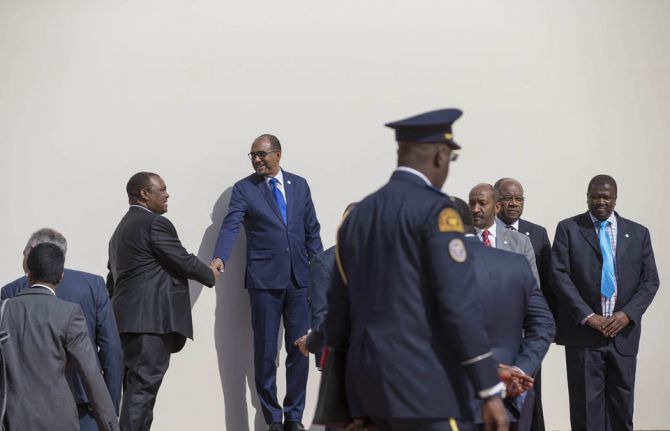
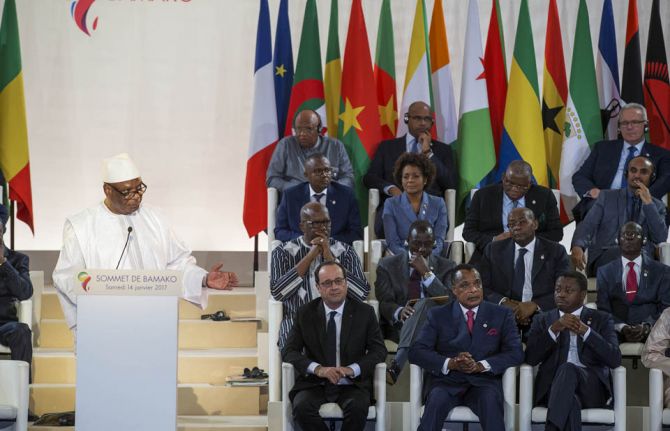
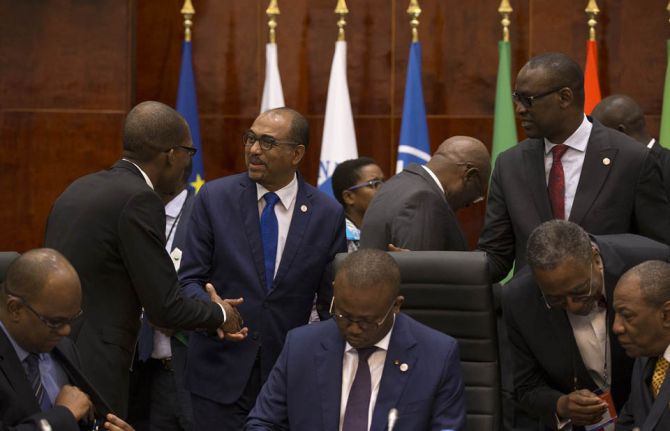
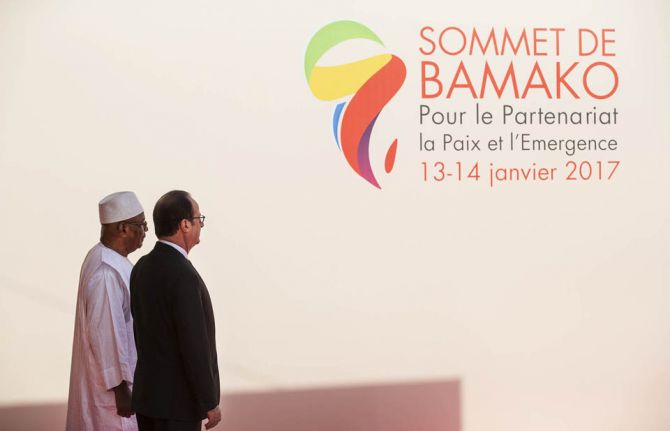
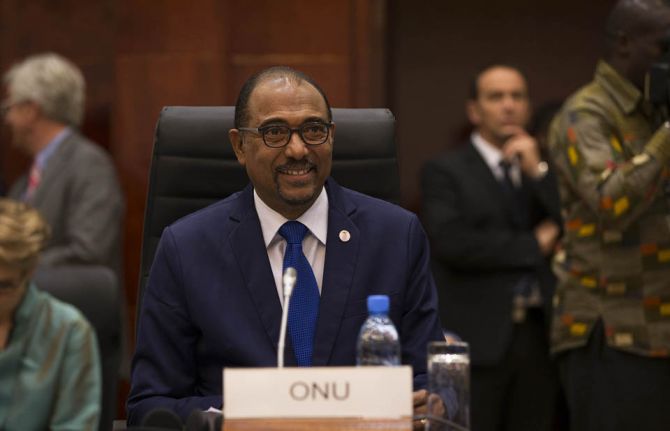
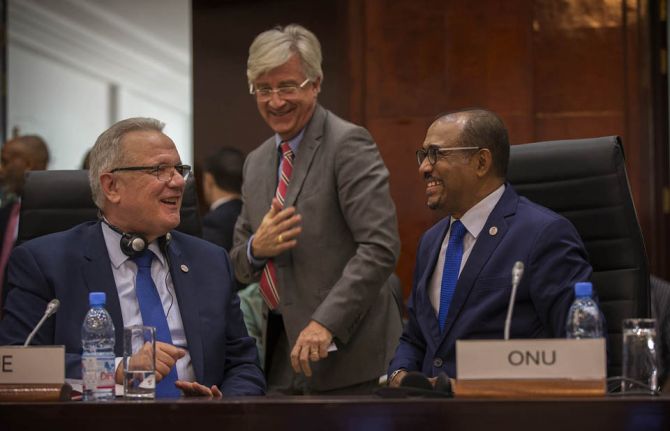
Update
UNAIDS at the 2017 Africa–France Summit
13 January 2017
13 January 2017 13 January 2017The Executive Director of UNAIDS has been nominated by the new United Nations Secretary-General, António Guterres, to represent him at the 2017 Africa–France Summit in Bamako, Mali. The summit, co-organized by France and Mali and taking place on 13 and 14 January, will welcome around 2000 participants across the two days. Around 30 heads of state and government are expected to attend, including the President of France, François Hollande, and the President of Mali, Ibrahim Boubacar Keïta.
The theme of the summit is partnerships, peace and security, and in addition to strengthening cooperation between Africa and France, discussions will take place on the current and emerging threats to peace and security and ways of countering them, including improving education and training, increasing investment and bolstering development efforts.
The heads of state will meet in closed sessions devoted to two overarching themes: security, including the fight against terrorism, the economy and development.
On the eve of the event, Mr Sidibé gave the keynote speech at the Youth Forum, which is supported by the United Nations Population Fund, where he called for the empowerment of young people and for social safety nets to be put in place to ensure a more secure future for African youth. The young people prepared a statement in which they called for more investment in young people to enable them to reach their full potential.
As well as participating in the official Africa–France Summit programme and holding one-on-one meetings with high-level representatives, Mr Sidibé will attend an event for first ladies, hosted by the First Lady of Mali, Keita Aminata Maiga, which is aimed at moving the reproductive health agenda forward for young people across Africa. At the end of the session, the first ladies are expected to adopt a commitment to action on health and young people.
Quotes
Peace and security are essential to develop businesses and create wealth. Development will not be possible without peace. It is crucial that young people take on board and embrace the notion of peace. Young people of Africa, of France and of the diaspora, you must become the agents of peace to be able to become the entrepreneurs of the future.
Investing in young people is insurance for the present and savings for the future.
Problems with governance have a serious impact on the lives of young people, causing some to leave or even be conscripted by terrorist groups. The Mediterranean far from being a bridge between two continents: is a breaking point between hope and despair.
Young people across Africa are demanding peace and we must ensure that the 200 million young Africans can live in peace and participate in the development of the African continent and the world.
I wish for greater involvement of young people in development programmes to allow us to benefit from their creativity, expertise and proactivity. I call on young people to mobilize to put pressure on African leaders so that the next Summit of the African Union will have concrete actions to allow young people to realize their full potential.
Region/country

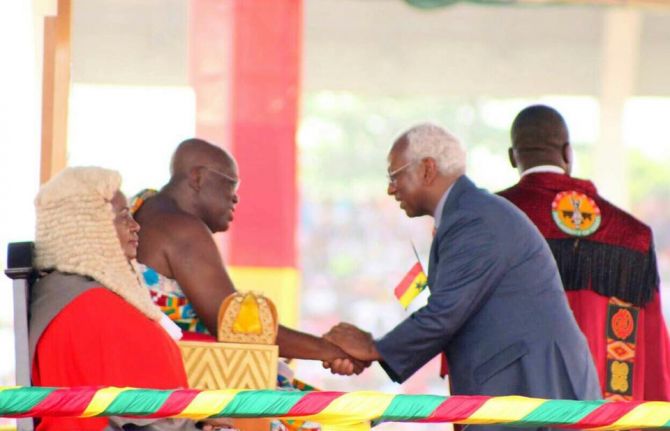
Update
UNAIDS Executive Director recognizes leadership of former First Lady of Ghana and formally establishes UNAIDS country office
13 January 2017
13 January 2017 13 January 2017On 6 January, Lordina Mahama, First Lady of Ghana, was awarded a UNAIDS Certificate of Appreciation by UNAIDS Executive Director Michel Sidibé in recognition of her Presidency of the Organisation of African First Ladies against HIV/AIDS and her commitment to, and leadership in, ending AIDS in Ghana.
On the same day, UNAIDS was formally accredited by the Government of Ghana through the signing of a Basic Cooperation Agreement by Hanna Tetteh, Minister of Foreign Affairs and Regional Integration, Ghana, and Mr Sidibé. The signing ceremony was followed by the inauguration of the UNAIDS country office in Accra by Mr Sidibé, attended by representatives of civil society and the private sector and United Nations partners.
During the mission, Mr Sidibé paid a courtesy call to the former President of Ghana, John Dramani Mahama, and attended the inauguration of President Nana Addo Dankwa Akufo-Addo.
Quotes
“I am very touched by the recognition of our work on HIV in Ghana and with the Organisation of African First Ladies against HIV/AIDS. My commitment will continue beyond my role as a First Lady.”
“This is a major milestone in the growing and strengthened relations between UNAIDS and the Government of Ghana.”
“Ghana is an important leader in the response to end AIDS. President Mahama played a critical role in bringing the voice of the continent to the world and engaging with world leaders as a Commissioner of the UNAIDS and Lancet Commission: Defeating AIDS—Advancing Global Health. I am delighted that his legacy has placed Ghana as the Chair of the UNAIDS Programme Coordinating Board and look forward to Ghana continuing its leadership role in the global HIV response.”
Region/country
Related
 Impact of US funding cuts on HIV programmes in Ghana
Impact of US funding cuts on HIV programmes in Ghana

08 April 2025

Update
Strengthening the gender-sensitivity of national HIV monitoring and evaluation systems
12 December 2016
12 December 2016 12 December 2016The World Health Organization and UNAIDS have released a new publication to enhance the ability of countries to collect, analyse and disseminate gender-responsive data.
A tool for strengthening gender-sensitive national HIV and sexual and reproductive health (SRH) monitoring and evaluation systems helps countries to assess whether their monitoring and evaluation systems are capturing data on gender inequality and HIV and to analyse data on the HIV epidemic and response from a gender perspective.
The gender-sensitive data analysis described in the publication uses existing data, including sex- and age-disaggregated data, to help identify whether inequalities exist in HIV outcomes by gender, as well as by age or key populations, and potential contributing factors.
The publication is a complement to the UNAIDS gender assessment tool.
In order to achieve the Fast-Track commitment to eliminate gender inequalities and end all forms of violence and discrimination against women and girls, people living with HIV and key populations by 2020, it will be important to ensure that data are available to assess whether inequalities exist in HIV outcomes.
More than 25 countries have piloted the tool. Countries noted that it could also be used to inform national strategic plan reviews and the development of concept notes for submission to the Global Fund to Fight AIDS, Tuberculosis and Malaria.



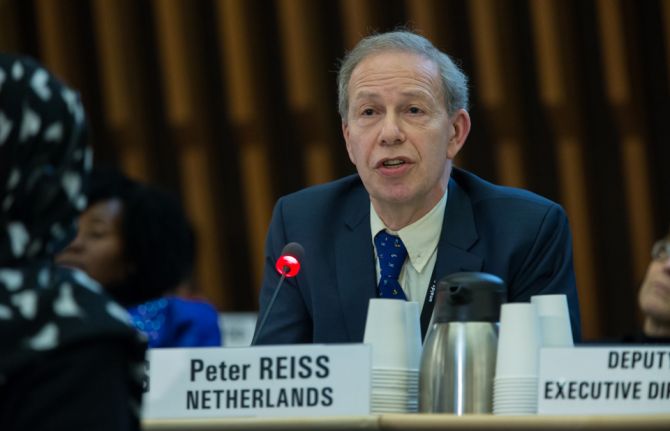

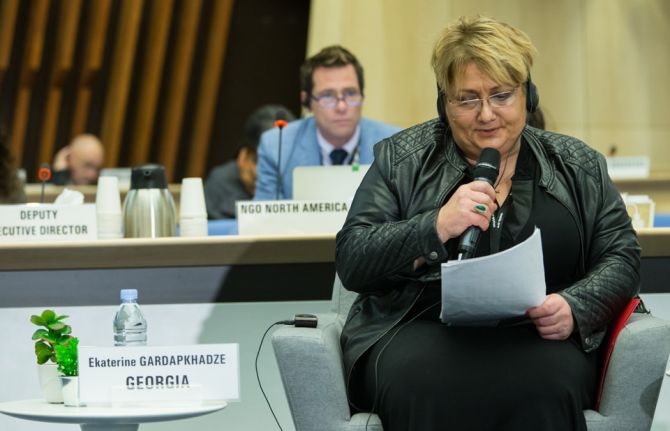
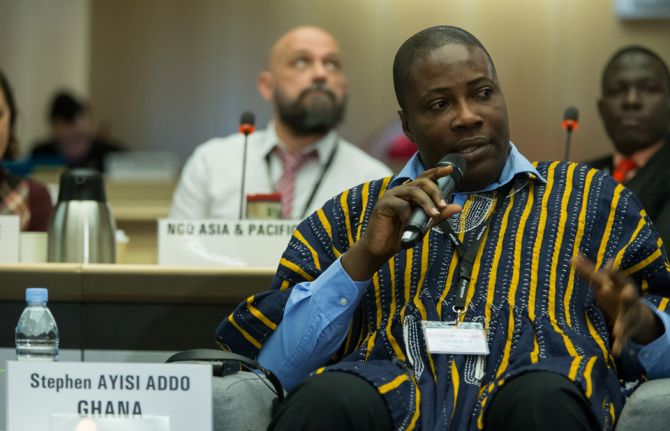
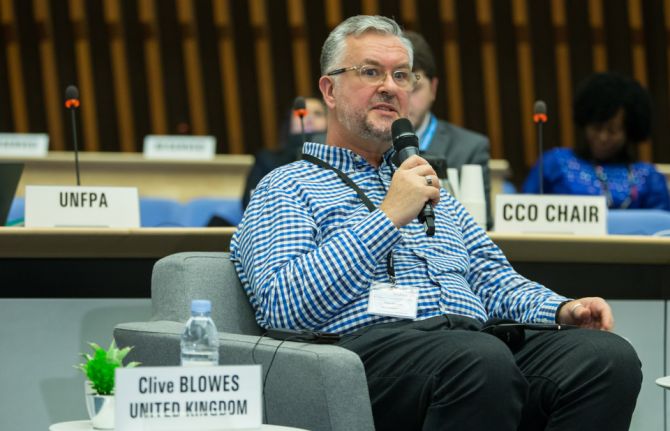
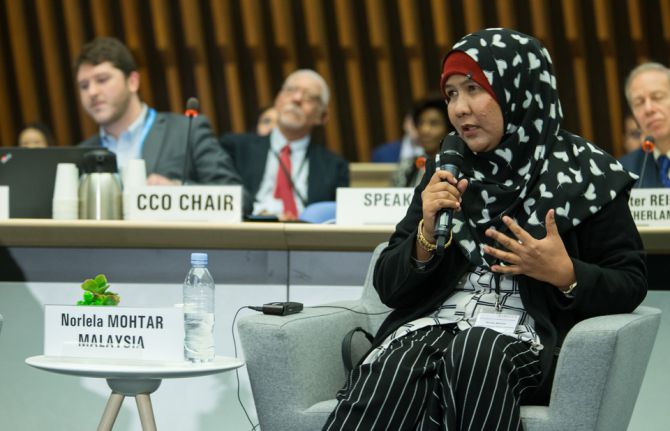
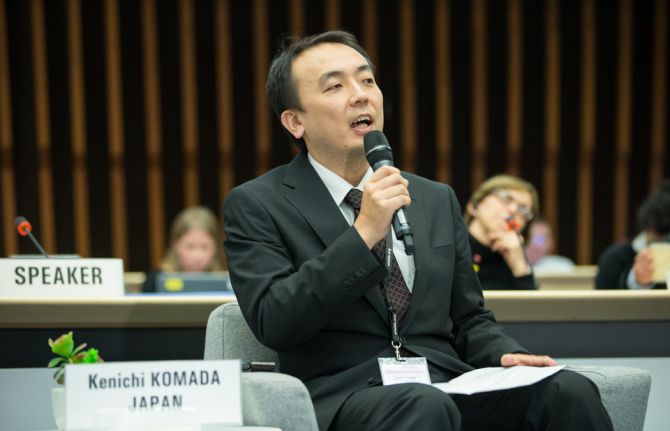


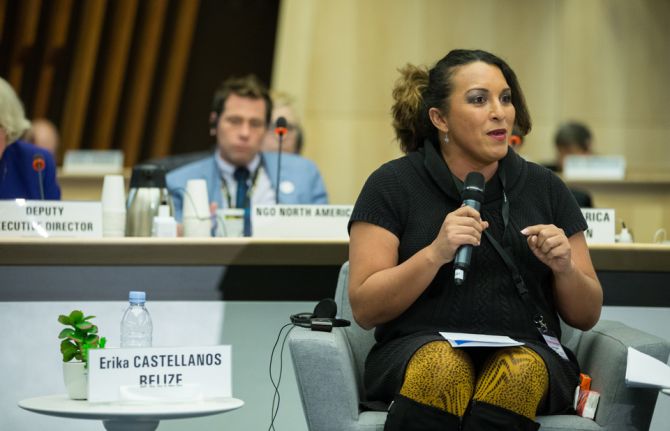
Update
UNAIDS PCB session on ageing and HIV reaffirms that an ageing population of people living with HIV is a measure of success
12 December 2016
12 December 2016 12 December 2016On 8 December, the thematic session of the 39th meeting of the UNAIDS Programme Coordinating Board (PCB) focused on ageing and HIV.
Out of 36.7 million people living with in 2015, 5.8 million were aged 50 years and older. With the expansion of access to treatment, more people living with HIV are surviving and ageing.
The PCB thematic session brought together representatives of civil society, governments and development agencies to explore the experiences of people living with HIV older than 50 years of age and to learn lessons from health, community and social protection systems for older people.
A successful AIDS response must continue to expand treatment access equitably, by providing people-centred, age-sensitive and integrated health services. Moreover, people living with HIV must be supported to lead long and healthy lives, and people over 50 years of age should have equal access to social protection, employment and social integration.
The thematic session also explored the HIV vulnerabilities for people over 50 and the importance of age-sensitive prevention, testing and linkage to care programmes. People over 50 have the same prevention needs as younger people.
The diversity of people over 50 years old was a theme that emerged throughout the session. There was a call for treatment, prevention, care and support services that acknowledge and respond to the specific needs of older people who use drugs and older sex workers, gay men and other men who have sex with men and transgender people.
Also explored during the session was how to learn from the experiences of people living with and/or at risk of HIV over 50 years old and how to apply those lessons learned for an effective AIDS response. The participants confirmed the need for a life-cycle approach and a well-equipped system for health that anticipates and meets the needs of people living with and at risk of HIV as they age.
Future work includes research on the physical effects of ageing with HIV, the long-term effects of antiretroviral therapy and innovations to ensure uninterrupted and quality treatment access for all.
The meaningful engagement of older people living with HIV can support national, regional and global responses to HIV to ensure that older people living with HIV live long and healthy lives.

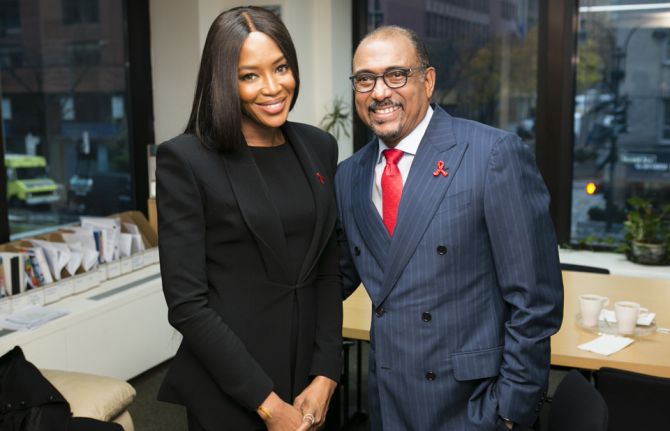
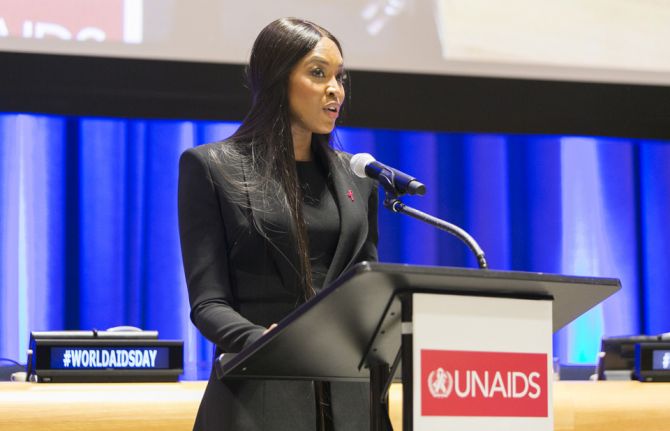
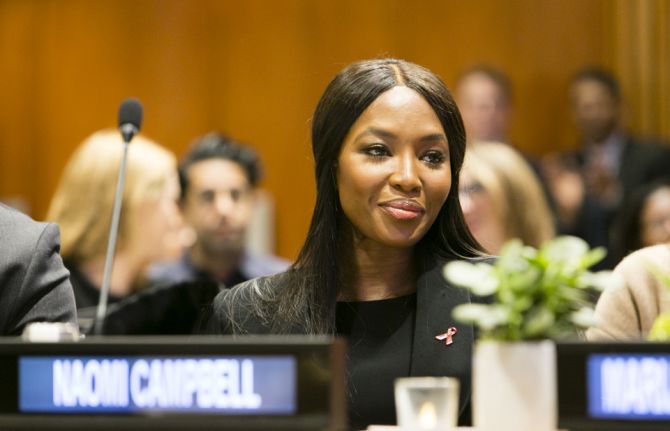
Update
Naomi Campbell donates funds raised by ICAP to UNAIDS
13 December 2016
13 December 2016 13 December 2016Following her participation at UNAIDS’ World AIDS Day event in New York, United States of America, Naomi Campbell has chosen UNAIDS to benefit from a US$ 100 000 donation, to be shared equally between the United Kingdom charity Save the Children and UNAIDS. Model, actress and philanthropist Naomi Campbell was invited to meet with staff at the Jersey City office of ICAP, a United Kingdom-based financial broker; during the event, a donation was made by the company to a cause of her choice. Each year, on one day in December, ICAP donates all of its global commission revenue to charity.
During the World AIDS Day event in New York, which honoured the United Nations Secretary-General and his commitment to ending AIDS, Ms Campbell spoke of her commitment to preventing and treating HIV globally. The donation will contribute to UNAIDS’ work towards ending the AIDS epidemic by 2030.
Quotes
“Thank you Naomi! I applaud your longstanding and continued commitment to ending AIDS. Naomi has been a tireless activist, raising awareness about HIV among new generations of girls and young women and reminding the world that AIDS is not over, but it can be!”
“I stand in solidarity with the millions of young women and adolescent girls growing up in a world where they are at risk of HIV,” she said. “I want to make a difference—you can count on me to do what I can to help end AIDS.”




